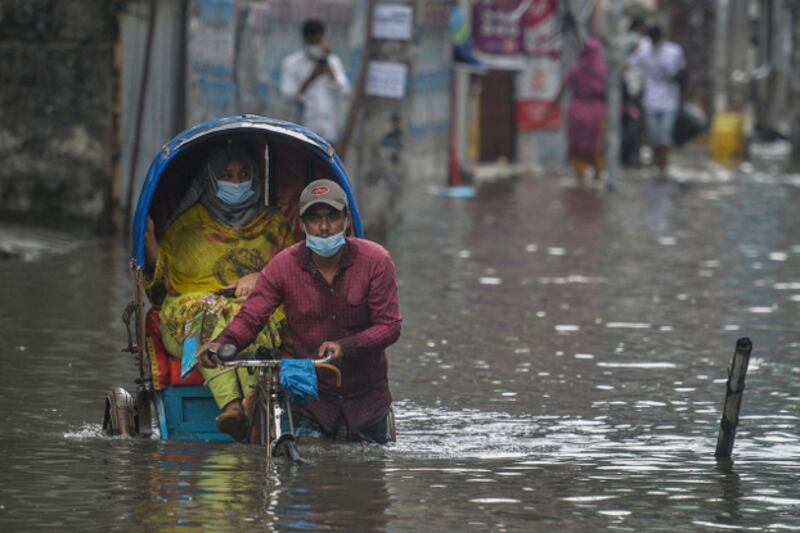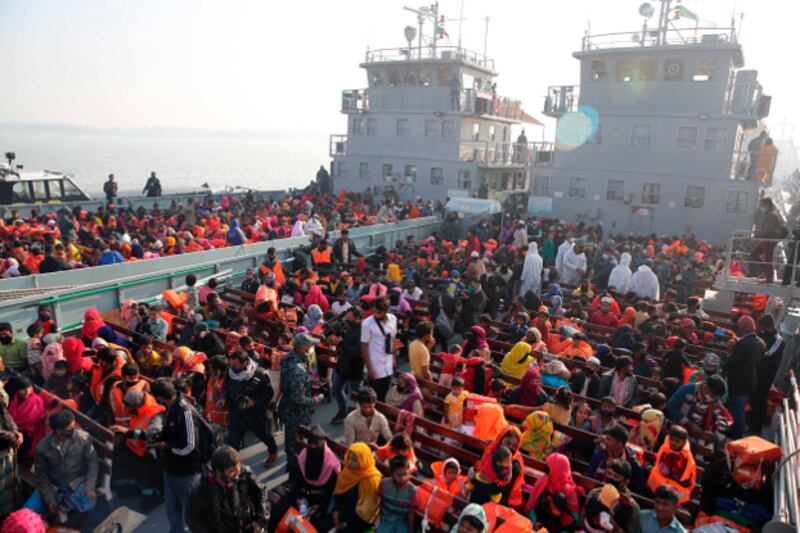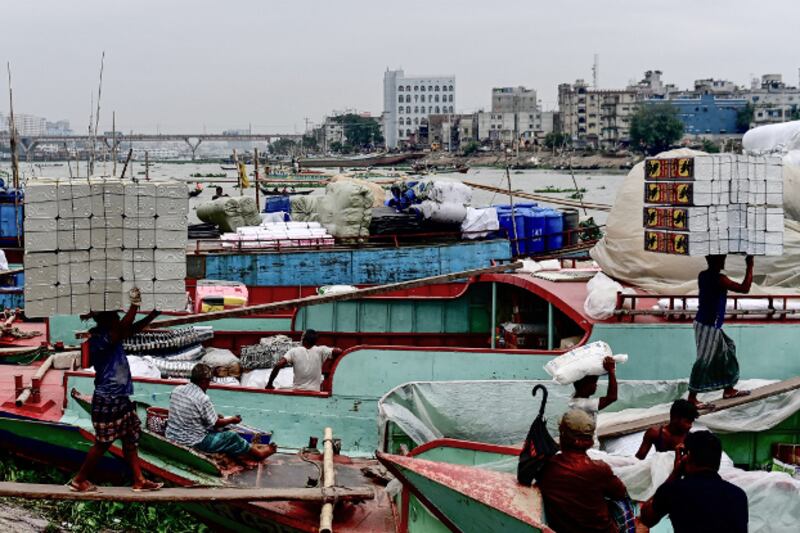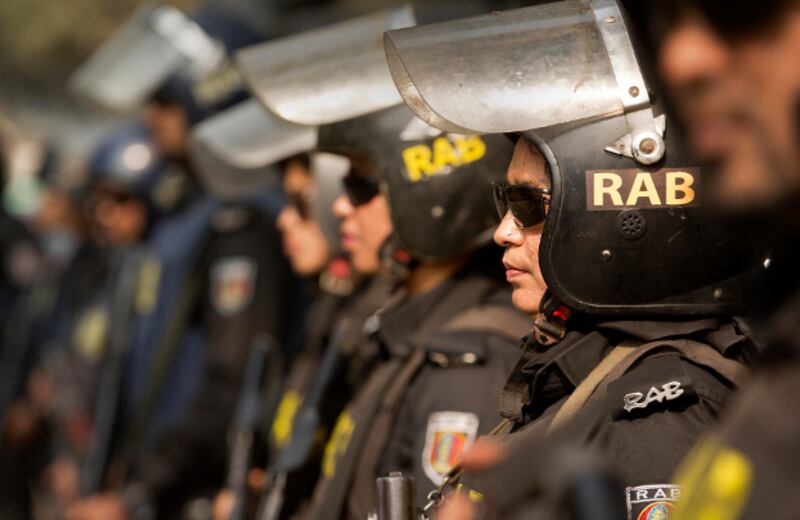Md. Shahriar Alam, Bangladesh’s state minister for foreign affairs, was in Washington last week for bilateral talks with U.S. government officials.
He was part of a Bangladeshi delegation involved in meetings here for the Second High-Level Economic Consultation with the United States.
The state minister sat down for a one-hour interview with BenarNews at the Bangladesh Embassy on Thursday night. He answered questions ranging from climate change, to the Rohingya refugee situation, Russia's invasion of Ukraine, foreign investment in his country, and U.S. sanctions against Bangladesh's elite police unit, the Rapid Action Battalion, over alleged human rights abuses such as enforced disappearance and extrajudicial killings.
Excerpts from the interview:

BenarNews: Did you discuss the climate crisis in today's bilateral meeting?
Shahriar Alam: There is a direct relation between climate change and health. We discussed that Bangladesh's pharmaceutical companies and private sector companies are coming forward with extensive research. The U.S. has developed a lot in health-related scientific research.
We want to see the interest of the U.S. in South Asian counties like Bangladesh as they are living in tropical weather where climate change research can be conducted.
We appreciated that the Biden administration has taken climate change issues back into consideration, which the Trump administration ignored, frustrating us. That is now in the past, there is a space [for] cooperation as per our latest commitments.
For example, we have shut down 10 planned coal-based power plants. … It is a big sacrifice for a country like Bangladesh where the canceled 10 power plants had the potential to bring $12 billion in foreign investment.

On Myanmar and the Rohingya
BN: Are you satisfied with the initiatives taken by international communities to solve the Rohingya crisis?
SA: No, we are not satisfied. I want to say it very clearly. The United Nations has failed and the U.N. Security Council has failed. ... The bottom line is, no matter how anyone is seeing the situation, the crisis is still unresolved.
BN: What is the current state of diplomatic relations between Bangladesh and Myanmar? Is there any progress in negotiations on Rohingya repatriation?
SA: Discussions about repatriating a small number of people have come a long way. But the discussions stopped again after reaching a stage. So it is sad to say the same thing over and over again, that there has been no real progress in the negotiations.
We see some movements by their incumbent military government when a great deal of pressure is exerted by the international community. … So very naturally the question arises in our minds whether they really want [repatriation]? Or are they doing this to show others? We fear this second possibility. But we are engaged, we are serious. …
I had discussions with the representatives of the UNHCR and the International Committee of the Red Cross in Switzerland last week. They recently went to Myanmar and talked to them. They have started some work, but no major progress worthy to be disclosed has been made on Rohingya repatriation.
BN: Has the crisis in Ukraine diverted the world's attention from the Rohingya issue?
SA: Maybe. We never rule out that possibility. But I was at the U.N. a few days ago. There were activities of the International Forum for Migration. Then I went to the World Economic Forum. We were participating in an economic dialogue [in Washington] today.
The Rohingya issue has come up. It was not on the agenda, but they mentioned it and thanked Bangladesh for giving shelter to so many Rohingya.
The United States has so far provided the highest level of humanitarian assistance to the Rohingya, as a single country. I don’t think they will turn their backs on the Rohingya – I don’t see any possibility, at least in the case of the United States.

On Sri Lanka and Chinese loans
BN: During a recent talk in Washington, Foreign Minister Momen used the words "baskets of money" and "aggressive proposals" to describe Chinese investment in Bangladesh. Recently, Sri Lanka's financial crisis and multi-billion dollar debt to Beijing has been discussed everywhere. Is Bangladesh at risk?
SA: Of course not. … The economic base of Bangladesh is stronger than many developed countries. To measure the situation of foreign debt, you first have to see the balance between the debt and GDP. When the threshold figure of debt goes up to 70 percent to 75 percent [of GDP], then it is risky.
Another thing is, that our dollar earnings against the foreign debt is vibrant. … The highest amount of remittances is coming into the country during two Eids [festivals]. Quite simply, we are sending money to our parents and families. On these two occasions, the country’s economy is seen as rich. A few days ago, the World Bank projected that Bangladesh’s economy is projected to grow 7 percent in 2023. …
And now food prices are a bit higher due to the Ukraine war … but this is not applicable to Bangladesh as we are producing most of our food on our own. Sometimes, we import a little rice. We import wheat. We have enough capacity in this regard.
Inflation in [other] countries can have an impact on Bangladesh. To face such risk, fiscal policy is required; it will be reflected next week in Bangladesh in the national budget.
There are many mega projects in Bangladesh. One of them is the Metro Rail project, there is no Chinese investment but it is funded by JICA of Japan. ...
China has invested in the Karnaphuli tunnel project. This is normal.
Those who have the economic capacity, the technology and the mentality to help another country, any country, will go to them. There are more Chinese investments in other countries than in Bangladesh.

On sanctions against RAB
BN: After U.S. sanctions against the elite police unit Rapid Action Battalion, the incidents of so-called crossfire have come down to almost zero. Is it an outcome of U.S. sanctions?
SA: I don't think so. You will see the same developments for a few months before the sanctions. The change started before it.
You should know that we have established RAB in Bangladesh with the help of the U.S. It has provided weapons, their training, their technology … the U.S. has invested, trained and even contributed to the procedure. …
Before imposing sanctions, the U.S. agreed to help overcome issues. They were to help improve the internal management issues, as the punitive measures were being taken against the wrongdoers. They started to help or had assured they would help. But they took an abrupt decision to impose sanctions. We think this action is disproportionate.
RAB has contributed much to control militancy and terrorism. Among the law enforcement agencies in the world, RAB has contributed to this end beyond Bangladesh, beyond South Asia, beyond Asia. RAB has one of the most effective roles in suppressing militancy and terrorism.
When any force, which is engaged in such risky work, or any force which has a weapon in its hand, we do not want to rule out the possibility of some persons going the wrong way in some individual decision.
BN: Have you received any assurance or indication from the U.S. that sanctions may be revoked?
SA: No, we did not get any such assurance. We are not expecting a solution tomorrow. What we are trying to say is that it was done on the basis of misinformation, it was a disproportionate reaction.
They should not make any further decisions in the future on the basis of misinformation. That is why we have undertaken some activities. You will see us a little more in Washington … we will continue with the bilateral mechanisms that we have. If there is any question of clarity or ambiguity of information, they should want to know from us first. At least that’s what we’ve been able to do. That is why there is so much engagement, official engagement.
